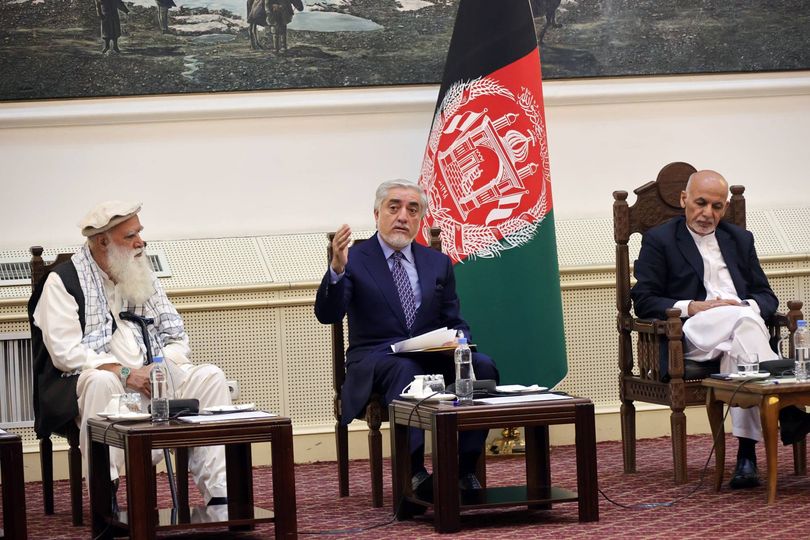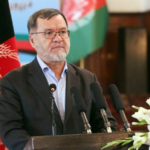Abdullah Abdullah, chairman of the High Council for National Reconciliation (HCNR), at the council’s leadership committee meeting at the Presidential Palace on Wednesday said that “the survival of Afghanistan is in danger.”
The sixth leadership committee meeting of the HCNR was held at the Presidential Palace and was attended by President Ashraf Ghani, HCNR members and other government officials.
“The truth is, today the survival, security and unity of Afghanistan is in danger.” Abdullah said. “There is no better way than peace.”
“With the withdrawal of foreign troops from the country, the war has escalated. Unfortunately, the Taliban side has taken advantage of this, and the foreign troop withdrawal has naturally left a vacuum in some areas,” said Abdullah.
In April, US President Joe Biden announced that the US troops would leave Afghanistan by September 11.
“Although teams from both sides are in Doha and in contact, we have not witnessed any progress,” Abdullah said. “They (the Taliban) take very slow steps in the peace talks but have increased the war on the battlefield.”
“Unfortunately, the Taliban wasted time in the peace process over the months, and there was concern among the people that the Taliban had no intention or will to seek peace. This concern is now growing day by day,” he said.
“The truth we are facing is the escalation of the war. In today’s meeting, I cannot see anyone that says we must continue the war and the way out is war.”
This comes as Germany’s last troops left Afghanistan on Tuesday after nearly 20 years of deployment in the country, said the German Defense Minister Annegret Kramp-Karrenbauer.
The German defense minister said in a tweet that the last Bundeswehr soldiers “left Afghanistan safely” on Tuesday evening.
NATO agreed in April to withdraw at least 7,000 of its troops from Afghanistan.
At the time, Germany had around 1,100 troops in Afghanistan.
“We must consider the situation of the people of the nation and the situation that they are facing at the moment,” Abdullah said. “Creating unity among the people in support of peace and defending the system and defending their rights… those people who are affected by war and have the right to live in their own homes.”
“We want peace from the bottom of the heart … but we are in a situation where we are saying peace and they are (Taliban) nearing the capital of Afghanistan,” he said.
He also urged politicians to support the Afghan security forces.
“At this stage and as citizens, we must forget our titles and show we are accountable to those who have an eye on us and are saying that these people (politicians) have reached this level with our support, what are they doing now for us and what message do they have for the people of Afghanistan and what are they doing to rescue us?”
“This is the time and our responsibility,” he said.
He also mentioned that if the Taliban miscalculate that they can win militarily, then it will cause the “continuation of the war.”
“This will be a mistake if any side thinks they can win militarily,” he noted. “No regional country will benefit by the continuation of the war in the country.”
“Those countries who were not happy with the presence of foreign troops in Afghanistan, today they are facing another truth,” Abdullah said. “As are our neighbors, we are always seeking friendly relations.
“These countries also don’t want war to continue in Afghanistan: ‘God forbid, it will cause these people to be displaced and the growth of terrorism,'” he said.
There is an opportunity that the neighboring countries support Afghanistan in reach to lasting peace.
Speaking of the recent Washington trip, Abdullah said: “The United States’s message was even though we are withdrawing our troops, we are supporting the people of Afghanistan and we are with them.”
He further said: “The US said that we want peace and we also know the obstacles and the issues that have been created against peace…. But the people’s consensus will help us support you.”
On Tuesday, the US Defense Department asked the Taliban to return to the peace negotiations, reminding them that the violence remains too high in Afghanistan.
“What we want to see, what we’d like to see is the Taliban return to the peace process in a credible way,” Pentagon spokesman John Kirby said at a press briefing on Tuesday. “The violence remains too high, and we’re all aware of the security situation in Afghanistan.”
“I think you saw General Miller speak to that earlier today, concerns over the security situation there,” he added.
Referring to recent attacks by the Taliban, Kirby said, “We see events on the ground unfold, it certainly calls into question the sincerity of their efforts to be a legitimate, credible participant in the peace process.”
“That’s really the right future for Afghanistan as a political process that leads to a negotiated settlement and a peaceful end to the fighting in Afghanistan. And that’s what we’re in favor of. That’s what the administration’s policy continues to try to pursue,” Kirby said.
He said that once the withdrawal is complete, they will have two new mission sets at the Department of Defense: “One is to have a presence in Kabul that is sufficient to the task of protecting our diplomacy there. And two, to have a relationship with Afghanistan, a new bilateral relationship with Afghan forces that is designed to help continue their needs for competency and capability in the field.”
But he reiterated that this support – to Afghan forces – will be over the horizon logistical support and some financial support.
He also said that the removal of US combat forces, which is what the retrograde is all about, ends the combat mission in Afghanistan for the United States.











